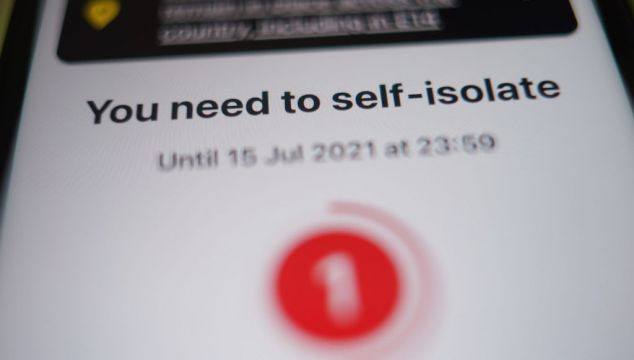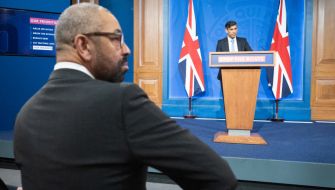Record levels of new Covid-19 infections have been taking a toll on the workforce, leading to large numbers of staff being required to isolate if they test positive for the virus or are a close contact of a confirmed case.
While these shortages were also noted in previous waves, most notably at the beginning of 2021, with 213,454 additional cases reported from January 1st-10th, the number of staff now absent due to Covid is pushing some sectors to breaking-point.
Here's what you need to know about what's going on with Covid isolation rules...
What are the current rules if you're a close contact?
At the moment, the number of days you must isolate if you're a close contact depends on whether you have received your Covid booster vaccine or tested positive for the virus in the past three months.
If one (or both) of those two scenarios apply, then you are required to restrict your movements for five days. If you have not received the booster jab, or the initial course of the vaccine, or have not recovered from the virus in the past three months, you must restrict your movements for 10 days.
For those who got their booster jab less than seven days before being identified as a close contact, they are required to restrict their movements for 10 days as the vaccine had not yet had time to offer optimum protection.
In each scenario, the period from which you must restrict your movements begins from the last day you were in contact with the person who has tested positive, or the day you received the close contact text if you cannot remember when you last met that person.
Why are the changes being considered?
As studies suggest Omicron infections are causing less severe illness than previous variants, there are arguments that current close contact rules are more stringent than required and should be eased to reduce staff shortages.
During the first week of January, over 6,000 healthcare staff were absent due to Covid, impacting services across the health service. Meanwhile, one quarter of retailers said they have been forced to close or reduce opening hours due to staff shortages, while Bus Éireann and An Post are just some of the essential service providers feeling the staffing strain.
An option being considered to ease these shortages is to reduce the isolation period of asymptomatic people who have received their booster vaccine, allowing them to continue working without the need to isolate.
What is the Cabinet discussing?
Having asked public health officials to re-examine the current close contact rules, the National Public Health Emergency Team (Nphet) has made recommended on the matter, which will be discussed by the Cabinet on Wednesday.
These recommendations were conveyed by chief medical officer Dr Tony Holohan to Minister for Health Stephen Donnelly on Tuesday evening, including:
- Asymptomatic close contacts who have received the booster jab should no longer have to restrict their movements for five days
- Close contacts who have not received the booster jab should restrict their movements for five days
- People who test positive for Covid should isolate for seven days
- Positive results from antigen tests should no longer require confirmation with a PCR test
These measures will likely be welcomed by the Government, with Tánaiste Leo Varadkar saying earlier on Tuesday that he would like to see an easing of the close contacts rules. Mr Varadkar claimed it "made sense" for people who had received their booster shot, were showing no symptoms, and had a negative antigen test to return to work, adding that public health measures should be balanced and not "cause more harm than good".
What are health organisations saying?
On Friday, the European Centre for Disease Prevention and Control (ECDC) issued updated guidance on the isolation periods for both close contacts and confirmed cases.
Offering suggestions to cover three scenarios based on the level of pressure being place on society and health services by Omicron, the ECDC suggested protocols for vaccinated and unvaccinated people.
In the case of extreme pressure being placed on the healthcare system, as is currently being experienced in Ireland, vaccinated people (those who have received a booster jab, or their initial course of vaccination in the past six months) are not advised to isolate, but take a number of precautions instead, including:
- Wearing a high-efficient (FFP2) mask for 10 days
- Take a PCR test five days after the contact with the person who is a confirmed case
- Watch for symptoms, keep a social distance from others, and avoid vulnerable people
Under the same scenario, unvaccinated people are advised to:
- Quarantine for five days
- Take a PCR test five days after the contact with the person who is a confirmed case
- Wear a high-efficiency (FFP2) mask for five days after their quarantine period ends
Despite the ECDC website stating that these are "non-evidence-based options", it is understood these guidelines formed part of Nphet's considerations.
What have other countries done?
A number of countries, particularly in Europe, have chosen to reduce isolation periods despite high infection rates across the continent.
On December 29th, the UK's health security agency reduced the self-isolation period for both vaccinated and unvaccinated people in England from 10 to seven days after they test positive for the virus, so long as they test negative on a lateral flow test. People who are fully vaccinated are no longer required to self-isolate as a close contact according to the NHS website.
The UK change came two days after a similar decision by the Centers for Disease Control and Prevention (CDC) in the United States, which reduced isolation times for people with the virus to just five days if they are asymptomatic or their symptoms are easing. Unvaccinated close contacts or those who received their last vaccine more than six months ago must quarantine five days, while people who received their booster vaccine do not need to isolate.
France, Spain and Germany are also among the countries which have made such changes, reducing both isolation periods for people who test positive for the virus and close contacts.
How do representative groups feel?
As businesses across many sectors struggle with severe staff shortages, the Irish Business and Employers Confederation (Ibec) have called for the rules to be eased to allow healthy staff to return to work.
The group's chief executive Danny McCoy said the absences were causing "critical supply chain issues", warning the "supply capacity is going down right across the economy".
However, the Irish Congress of Trade Unions (Ictu) has said isolation rules "must be guided by public health advice - not business needs" and must not put workers at risk.







